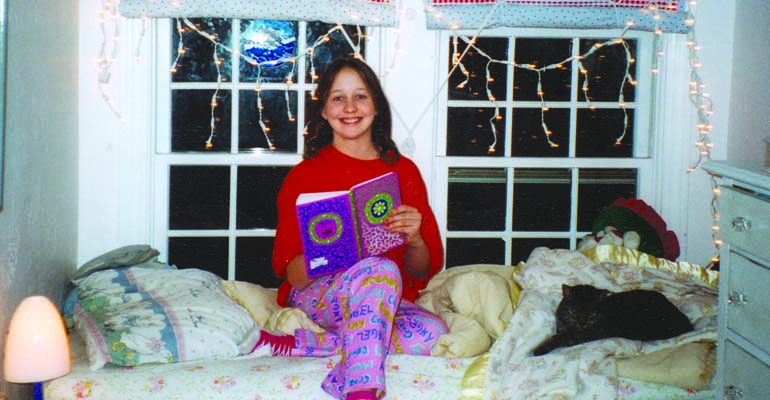On their very first overnight visit to our house, Alexandra and Angie, then 10 and 12, sat at their desk in their new room. We walked in to find Angie competently finishing off her weekend homework — and Alexandra’s!
“But I’m just helping her,” Angie explained when we objected. “She always needs help with schoolwork.”
Since the beginning of our adoption odyssey, we had known that Alexandra had a learning disability, specifically involving language and reading. She had been in special education classes from the start, and she was proud to have passed fourth grade just before coming to live with us. But we soon realized that her birth sisters, well versed in the art of playing the system, were the real reason Alexandra had passed from grade to grade. They had completed all her homework and done every project for her, year after year.
It was obvious now that Alexandra’s academic difficulties were going to be a real challenge for us in the years ahead.
Appraising Alexandra
Kathryn sat down with Alexandra to try to determine the extent of her difficulty with reading. They started with an easy reader — mostly pictures, with a few lines of text on each page — about a boy named Willy, who was afraid to swim after having been thrown into deep water by some bullies. Alexandra read haltingly, in a monotone voice. Halfway through, Kathryn stopped her. “Okay,” she said, “so why is Willy afraid to swim?” Alexandra looked at her blankly.
“Who’s Willy?” she asked.
We estimated that when Alexandra came to us, about to enter fifth grade, she was reading at a first-grade level. Later, we would learn the proper labels for her reading problems, but what we instantly observed was that Alexandra could read a passage aloud with no inkling of its meaning, and that she took everything literally. A word had one, and only one, meaning. How could she measure in feet and yards when feet are where you put your shoes, and the yard is outside in front of our house? How could America have broken away from England in colonial times, when it’s pretty impossible to break off a piece of land THAT big!
From the very start, we wanted Alexandra to repeat fourth grade. In a new town and new school, no one would even have to know that she was repeating a grade — and it would give her an extra year of childhood, an extra year to catch up on all the basics she had missed. But Alexandra was distraught! She desperately wanted to move on to fifth grade, and the teachers and specialists at our local school agreed that she should. We gave in, but were worried. How could this child, who could barely read, thrive in a vigorous fifth-grade curriculum if she had to do the work on her own?
The School Year Begins
There were ups and downs. We were adamant that Alexandra do the work by herself. We were available with explanations and examples, but all the work done that year was going to be her own. She was often in tears when we sent her back to try again.
We read to her every night, carefully choosing topics she loved: tales of orphaned children and abandoned animals finding new homes. Her attention span increased.
Yet there was still much to learn — not just facts and figures, but basic concepts, such as organizing events into a sequence and relating a story. When Alexandra would tell us about her day, at the dinner table, it sounded like gibberish. We spent a lot of time asking questions and having her slow down and start again! Sometimes we had to laugh: “The words are all there,” we told her. “You’ve just got to get them in the right order!”
With an IEP (Individualized Education Program) in place, along with a wonderful fifth-grade teacher and help at home, Alexandra officially passed fifth grade. Yet, having seen her struggle to master the most basic concepts all year, we were determined to have her repeat the grade.
Once again, we got little support. Even her teacher was dubious that an extra year would help. The school psychologist told us, “You might as well send her to middle school; she’s never going to be out of Special Ed.” When we received Alexandra’s standardized test results for that year, we saw the point. Our daughter had tested Far Below Basic in every subject except math, where she had scraped a Below Basic.
Yet there seemed to be a fundamental difference between the ways we and the school officials wanted to handle Alexandra’s problems. They were geared toward compensating for her academic difficulties and passing her through the system. It was enough for them that, though Alexandra would always struggle, she could officially complete her education through Special Ed. We wanted more for her. We wanted her to understand.
Two things gave us faith that having Alexandra repeat fifth grade would work. First, she was the hardest working child we had ever known. And second, since she had made giant strides in one year, we were still not sure which of her academic problems were organic and which were situational, caused by the chaos and neglect she’d experienced in her early life.
When we broached the subject of repeating fifth grade, she was dubious — but by then, she trusted us enough to consider giving it a shot. “Maybe it’s a good idea,” she told us. “Because I think I’m getting smarter — it’s like my brain is stretching!”
Watching Our Daughter Blossom
All of us — school officials and teachers, too — now agree that the decision to repeat fifth grade was the best one we could possibly have made. By going over the same material with a different teacher and having extra time to master skills, Alexandra blossomed.
She found immense satisfaction in doing all her own work, and her mastery of the subjects gave her confidence for the first time in her life. That helped her deal with the small amount of teasing that came her way. “I have a bad reading disability,” she told one boy. “But I’m really working hard on it and getting a lot better. Do you have a problem with that?” Abashed, he said he didn’t. In fact, Alexandra told us, he admitted that he sort of had a reading problem too.
We set up an intensive six-week summer course with a teacher in town who used a highly recommended reading method. We continued to read to Alexandra every night and were delighted when she picked up the ball and ran with it. By the end of her second fifth-grade year, she was hooked on the Sweet Valley Twins series. She also started reading historical fiction and mysteries. Additionally, her standardized test results were nothing short of amazing. She had boosted her scores by nearly 150 points in every area tested — even scoring Advanced in math — and increased her reading level by three grades.
Onward and Upward
Alexandra entered middle school this year at last — and for the first time in her life, she is not being taken out of class for Special Education.
Of course, we don’t know what the future holds for Alexandra, or for any of our children. She may continue to struggle in certain areas, but don’t we all? We feel that much of the foundation she missed in early life, before her adoption, is now in place. The rest of her success will come from her own perseverance.



